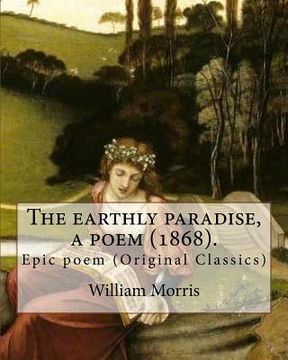The earthly paradise, a poem (1868). By: William Morris: Epic poem (Original Classics) (en Inglés)
Reseña del libro "The earthly paradise, a poem (1868). By: William Morris: Epic poem (Original Classics) (en Inglés)"
The Earthly Paradise by William Morris is an epic poem. It is a lengthy collection of retellings of various myths and legends from Greece and Scandinavia. It was begun in 1868 and several later volumes followed until 1870. The Earthly Paradise was generally well received by reviewers: according to one study it "established Morris's reputation as one of the foremost poets of his day". Morris uses a frame story concerning a group of medieval wanderers searching for a land of everlasting life. After much disillusionment they discover a surviving colony of Greeks with whom they exchange stories. The poem is divided into twelve sections, each section representing a month of the year and containing two tales told in verse, drawn largely from classical mythology or mediaeval legends, including the Icelandic sagas. All of Morris's subsequent books were published as "by the author of The Earthly Paradise". Story: The prologue introduces a company of Norsemen who have fled the pestilence and set sail to seek the fabled Earthly Paradise "across the western sea where none grow old." Not having succeeded in their quest, they have returned "shrivelled, bent, and grey," after lengthy wanderings abroad, to a "nameless city in a distant sea" where the worship of the ancient Greek gods has not died out. In this hospitable city they spend the rest of their lives. Twice each month they participate in a feast at which a tale is told, alternately, by one of the city elders and one of the wanderers. The former tell tales on classical subjects, and the latter draw their tales from Norse and other medieval sources. Thus, of the twenty-four stories, twelve are Greek and classical and twelve are medieval or romantic. Each pair of stories corresponds with one of the twelve months, the first two being told in January, the second two in February, and so on. Thus the long poem is neatly partitioned into twelve books with interpolated prologues and epilogues in the form of lyrics about the progressive changes in nature.............. William Morris (24 March 1834 - 3 October 1896) was an English textile designer, poet, novelist, translator, and socialist activist. Associated with the British Arts and Crafts Movement, he was a major contributor to the revival of traditional British textile arts and methods of production. His literary contributions helped to establish the modern fantasy genre, while he played a significant role in propagating the early socialist movement in Britain. Born in Walthamstow, Essex, to a wealthy middle-class family, Morris came under the strong influence of medievalism while studying Classics at Oxford University, there joining the Birmingham Set. After university, he trained as an architect, married Jane Burden, and developed close friendships with the Pre-Raphaelite artists Edward Burne-Jones and Dante Gabriel Rossetti and with the Neo-Gothic architect Philip Webb. Webb and Morris designed a family home, Red House, then in Kent, where the latter lived from 1859 to 1865, before moving to Bloomsbury, central London. In 1861, Morris founded a decorative arts firm with Burne-Jones, Rossetti, Webb, and others: the Morris, Marshall, Faulkner & Co. Becoming highly fashionable and much in demand, the firm profoundly influenced interior decoration throughout the Victorian period, with Morris designing tapestries, wallpaper, fabrics, furniture, and stained glass windows. In 1875, Morris assumed total control of the company, which was renamed Morris & Co. Although retaining a main home in London, from 1871 Morris rented the rural retreat of Kelmscott Manor, Oxfordshire. Greatly influenced by visits to Iceland, with Eiríkr Magnússon he produced a series of English-language translations of Icelandic Sagas. He also achieved success with the publication of his epic poems and novels, namely The Earthly Paradise(1868-1870), A Dream of John Ball (1888), the utopian News from Nowhere (1890), and the fantasy romance The Well at the World's End(1

